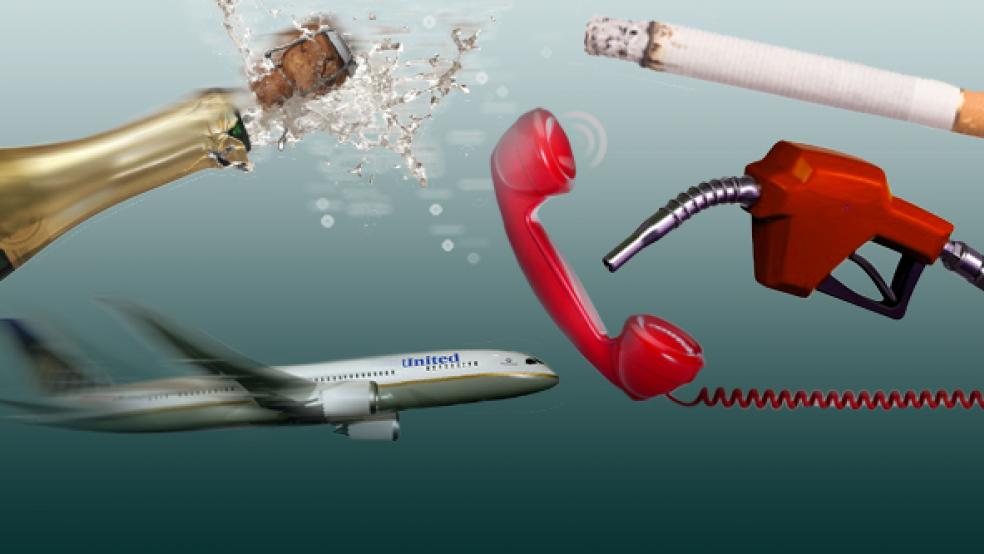Some taxes are a mystery. They’re not withheld from paychecks like income, unemployment, Social Security and Medicare taxes. They’re not added to purchases like ordinary local sales taxes. And they’re not what gets reported on your income tax return. But they pad our household expenses, from telephone and gas to air travel and immunizations.
It’s hard to quantify exactly how much they add up to. Some are built into the price of products we buy, others are listed on hard-to-decipher bills we pay. But if you total how much the federal government expects to collect in all these extra taxes in fiscal 2011 ($74.08 billion, according to the Office of Management and Budget) and divide that by the U.S. population (308.5 million according to 2010 census data), it comes to $240 per person. And that doesn’t include various fees and hundreds of state and local taxes.
Most of these taxes fall under the vague umbrella of “excise” taxes – a potpourri of extra taxes levied on specific products. Other charges imposed by federal agencies, such as the Federal Communications Commission or the Federal Aviation Administration, to support the agency or a program technically are fees and thus aren’t included in the $240 per capita total. But to the consumer, they can feel like taxes.
“Excise taxes … are really just ways to raise revenue that don’t really feel like a real tax, that people don’t think about,” said Mark Robyn, an economist at the Tax Foundation, a research organization that advocates for tax reform. “They’re the weakest link in the public’s opposition to taxation. They’re hidden.”
Some are new. After the Sept. 11, 2001, terrorist attacks, the U.S. government created a federal security fee – up to $10 per round-trip airline ticket -- to fund the new Transportation Security Administration or TSA. Others are old. The telephone tax was originally levied to pay for the Spanish American War in 1898. It was partly repealed beginning in 2006, but there’s still a three percent tax on local telephone service.
The largest excise tax, on gasoline, primarily funds the nation’s highway system; drivers pay at the pump for road maintenance and construction. Stealth taxes may also be used to change social behavior. The cigarette tax, which goes into the general fund of the federal budget, may help to dissuade smoking and pay for some of the associated costs.
Robyn says excise taxes are politically easier to enact. “When people are faced with choice of should we increase income taxes, sales taxes or cigarette taxes, people always choose cigarette taxes. People like taxes they don’t have to pay.”
Excise taxes and fees are typically paid by corporations at different stages in the production, wholesale and retail chain. Oil companies send proceeds of the gasoline tax to the government. Tanning salons cut the indoor-tanning-tax checks and brewers pay the beer tax to the U.S. Treasury. But consumers feel the brunt as businesses pass along their tax bill in the form of higher prices.
A group at the Massachusetts Institute of Technology used sophisticated modeling techniques to calculate that airline taxes added up to 17 percent of the average airline ticket in 2009. That’s $51 on a $300 ticket.
“The poor pay a much larger share of their income on these taxes. The gas, cigarette and alcohol taxes are highly regressive,” says Fred Giertz, an economist and an excise tax expert at the University of Illinois at Urbana-Champaign.
“But that’s not necessarily a condemnation of the tax,” he adds. “If the purpose of the tax is to fund roads or reduce smoking, then it’s serving its intended purpose.” Giertz says there’s research showing that alcohol taxes have reduced drunken driving and tobacco taxes have reduced smoking and ultimately lung cancer.
He argues the gas tax is too low. “Fuel economy has improved. We’re driving more miles per gallon and the wear and tear on the roads is increasing. But the gas tax hasn’t changed and the Highway Trust Fund is not as robust as it used to be,” Giertz said. As a result, he says, more money from the general fund paid by all income tax payers -- even non-drivers -- is now going to roads.
In an attempt to demystify some of the major excise taxes and fees, The Fiscal Times has compiled a list of 10 big ones, explaining what they are and where the money goes.


